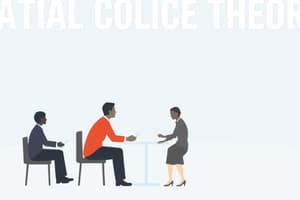Podcast
Questions and Answers
What does rational choice theory state about individual decision-making?
What does rational choice theory state about individual decision-making?
Individuals make decisions by rationally calculating the costs, benefits, and risks of their actions to maximize personal advantage and self-interest.
Who proposed the main ideas behind rational choice theory?
Who proposed the main ideas behind rational choice theory?
- Karl Marx
- Max Weber
- Adam Smith (correct)
- John Locke
Rational choice theory assumes that people always make fully rational decisions.
Rational choice theory assumes that people always make fully rational decisions.
False (B)
The __________ of the commons describes a situation where individuals make choices that benefit themselves but harm others.
The __________ of the commons describes a situation where individuals make choices that benefit themselves but harm others.
What are some fields where rational choice theory is applied?
What are some fields where rational choice theory is applied?
What is institutionalism in the study of society?
What is institutionalism in the study of society?
Institutions are only shaped by external forces and have no reciprocal relationship with individuals.
Institutions are only shaped by external forces and have no reciprocal relationship with individuals.
Which of the following is a type of formal institution?
Which of the following is a type of formal institution?
What role does religion play as an institution?
What role does religion play as an institution?
Flashcards
Rational Choice Theory
Rational Choice Theory
Individuals make decisions based on calculating costs, benefits, and risks to maximize personal advantage.
Adam Smith
Adam Smith
Economist and philosopher who proposed the idea of the "invisible hand" and self-interest.
Invisible Hand
Invisible Hand
Collective actions of self-interested individuals that lead to overall prosperity.
Tragedy of the Commons
Tragedy of the Commons
Signup and view all the flashcards
Prisoner's Dilemma
Prisoner's Dilemma
Signup and view all the flashcards
Institutions
Institutions
Signup and view all the flashcards
Institutionalism
Institutionalism
Signup and view all the flashcards
Formal Institutions
Formal Institutions
Signup and view all the flashcards
Informal Institutions
Informal Institutions
Signup and view all the flashcards
Rational Decision-Making
Rational Decision-Making
Signup and view all the flashcards
Study Notes
Rational Choice Theory
- Assumes individuals make decisions by maximizing personal advantage and self-interest.
- Calculates costs, benefits, and risks of actions.
- People control decisions, seeking to optimize rewards.
- Originated with Adam Smith in the 18th century.
- Self-interest leads to prosperity (Invisible Hand).
Characteristics of Rational Choice Theory
- All actions are rational, based on costs and rewards.
- Rewards must outweigh costs for an action to occur.
- Actions stop when reward value falls below cost.
- Individuals use resources to optimize rewards.
Applications of Rational Choice Theory
- Economics/business: explains market behavior.
- Psychology: explains addictive behaviors.
- Political science: explains government policies and voting behavior.
Limitations of Rational Choice Theory
- Assumes fully rational decisions, ignoring emotions, social factors, and cognitive biases.
- Focuses solely on individual action, neglecting social structures.
- Ignores the time constraints on complex decisions (e.g., life-or-death situations).
Examples Illustrating Rational Choice Theory
- The Tragedy of the Commons: Scarce resources lead individuals to act in self-interest, depleting the resource.
- Prisoner's Dilemma: Two suspects face choices to betray or remain silent; rational self-interest often leads to worse outcomes for both if cooperation is not possible.
Institutionalism
- Institutions involve organizations and formal social structures governing actions.
- Key area of study is analyzing how institutions shape social behaviors.
- Institutions are created and changed by human interactions.
- Individuals influence and reform institutions.
- The study examines reciprocal relationships and societal change.
Types of Institutions (Formal)
- Habits: Repeated, ingrained actions (daily exercise).
- Customs: Group habits tied to social aspects (cultural eating practices).
- Conventions: Agreed-upon procedures for social stability (language rules, laws).
Types of Institutions (Informal)
- Widely accepted norms and behaviors; not legally codified.
- Example: "utang na loob" (Filipino concept of gratitude).
- These norms guide behavior without explicit laws.
Feminism
- Social movement and ideology striving for gender equality.
- Rooted in awareness of women's oppression.
- Seeks equality across different spheres—workplace, media, politics, etc.
Types of Feminist Theories
- Liberal Feminism: Gender inequalities rooted in social/cultural attitudes leading to discrimination. Focuses on legal/economic/social rights.
- Radical Feminism: Gender inequality due to patriarchy (systematic male dominance across all aspects of life). Men exploit women.
- Black Feminism: Intersectionality of gender, race, and class: Oppression of non-white women.
Postmodern Feminism
- Challenges unified theory of women's position in society.
- Views gender as a spectrum rather than definite categories.
- Recognizes and embraces differences in experience (heterosexual, homosexual, lesbian, etc).
Hermeneutic Phenomenology
- Qualitative research method interpreting the essence of lived experiences.
- Combines phenomenology (subjective experiences) and hermeneutics (interpretation).
- Aims to uncover meanings individuals attach to experiences.
- Method uses careful analysis of participants' narratives to identify key themes/meanings.
- Removes bias (preconceptions) for a clearer study.
Application in social sciences
- Valuable in disciplines like psychology, sociology, and pedagogy.
- Offers insights into complex social phenomena; quantitative methods may overlook.
- Focuses on lived experiences; seeks understanding of human subjectivity.
Human-Environment Systems
- Relationship of humans and their environment; each impacts the other.
- Human activities (farming, urbanization) impact environments.
- Environmental factors influence human behavior, culture, and society.
- DPSIR Model: Framework that analyzes interactions (Drivers, Pressures, State, Impacts, Responses) to study environmental changes.
Studying That Suits You
Use AI to generate personalized quizzes and flashcards to suit your learning preferences.




